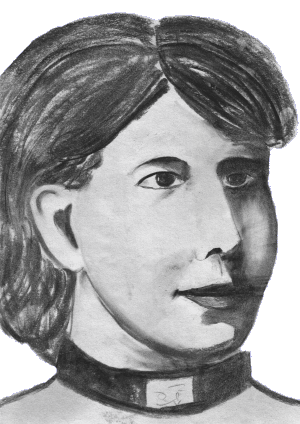
| |

Sophia Wassiljewna Kowalewskaja
Sophia Kowalewskaja grew up in Russia in the middle of the 19th century. She was already fascinated by mathematics early in her life and made it her goal to learn all about it. For her, this wasn't as easy as it may sound: in those days women weren't admitted to Russian universities. And she couldn't get to Europe without the consent of her parents because women didn't have their own passports.
To overcome these problems, she entered a fictious marriage when she was eighteen. For women this was a widely used possibility to get out of the country. Soon afterwards Sophia moved to Germany with her husband where she had to convince several math professors to let her study with them. As a woman she needed special permission.
Sophia was always politically very active. She was an open nihilist, favored a free Poland (Poland was part of Russia in the 19th century), and she of course helped many women in acquiring a higher education. She was friends with several radical leaders, which later on almost cost her her university job. After the death of her sister who was a writer, she also took up writing.
Seven years after acquiring her Ph.D., a friend of Sophia's got her a teaching job in Stockholm. Her life in Stockholm was fine, except that she hardly got paid for the first few years. While she was there, she also finished her most important mathematical paper for which she was given an award. She could never accomplish, however, her dream to get a professorship in her homeland, nor did a woman take over her position as she had hoped for when she died in 1891.
It is remarkable that 100 years ago women still weren't generally admitted in universities. While Sophia was a professor in Stockholm, she couldn't go to a German university and listen to a lecture without special permission. After she and several other women got themselves a name as lecturers, the universities even tightened their rules because the teachers were afraid to lose their jobs. But luckily Sophia and all the other women won and today anyone can study mathematics or any other subject.
